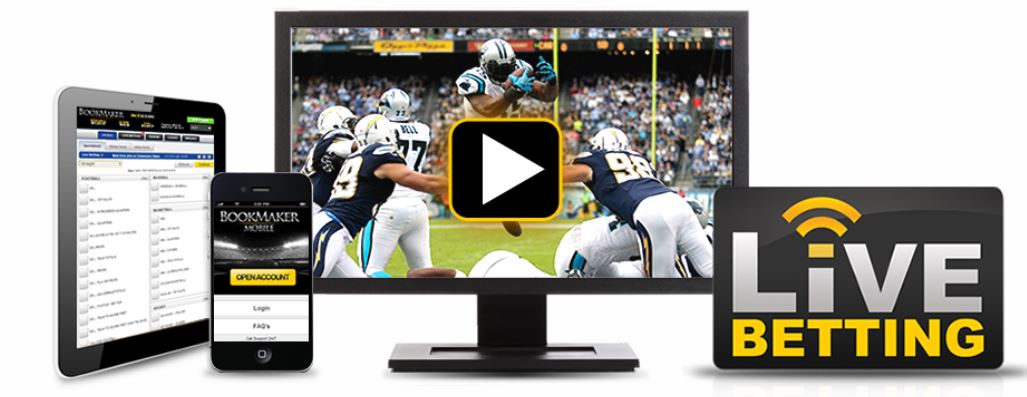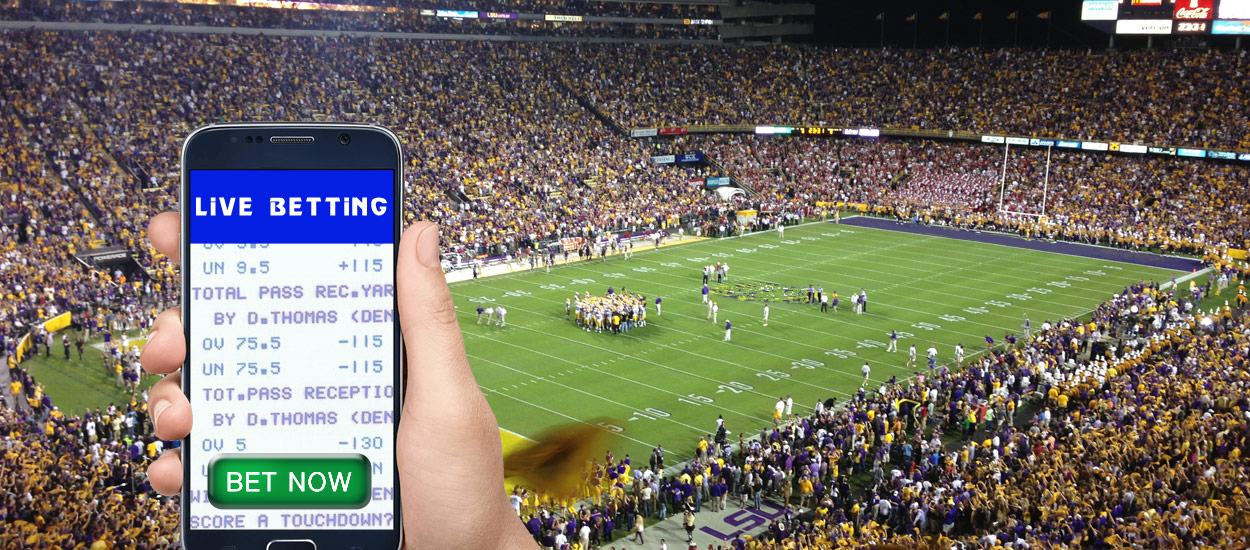Until the introduction of the internet, betting on games after the start was unheard of. Many sportsbooks posted 2nd half lines for football games, but otherwise betting markets were closed as soon as the games started. The reason that was the case was simply because ticket writers could never keep up with the odds as quickly as the game was changing. What would be quoted on a live board would almost certainly change by the time someone 5th in line got up to the window and it would cause controversy.
One Las Vegas sportsbook operator I spoke to back in the 1980s told me that his book tried to adjust lines after each stoppage in play in NFL games, but it became so confusing to both the tellers and the bettors that the sportsbook decided that the loss of goodwill due to line changes wasn’t worth offering it. He also stated that sharp players seemed to be better at adjusting to betting in-play than the sportsbooks’ handicappers were. "We posted odds based on the mathematics of a line while bettors were able to read the game play and bet with common sense. We always seemed to get one-way action after a game started and it was a weekly losing offer, so it didn’t even last a year."
In 1997, however, the Internet became a viable form of communication for betting and several companies decided to offer live betting odds. World Sports Exchange (WSEX) was the first site to allow bettors to wager as the game or event was being played and they also offered unique props like what the result of the next at bat would be in baseball or whether the next set of downs would result in a score or a punt in a football game. WSEX also offered betting markets where one could buy or sell their position throughout an event. For the most part, WSEX kept the lines closed while play was going on, but reopened them at a stoppage in play, the one exception being golf which was open almost throughout. The late bet manager at WSEX, Steve Schillinger, told me that it worked well until late in the games where everyone was trying to buy or sell their positions and he just couldn’t keep up with the demand. At times it even crashed their system. So, the company decided at a certain point they had no choice but to just close the markets for good. Not long after WSEX, Betfair created a live betting market as well, but unlike WSEX Betfair is player-to-player wagering and there is zero risk to the company itself. Bettors back or lay positions and Betfair takes a commission. Consequently, the markets stay open until the game or event is completely decided. Betfair’s betting market became so popular that for a time it was the largest betting site in the U.K. Betdaq and Matchbook tried to follow with a similar offering but never reached the levels of Betfair.
It was only in the last few years that British books tried to compete with Betfair by offering in-play wagering of their own. Bet365 was arguably the first book to do so, although every major U.K. sportsbook now offers in-play wagering and most offshore books like BookMaker, 5Dimes and all the sportsbooks on OSGA’s top sportsbook list offers some form of in-play wagering. Mind you the offers offshore are usually restricted to events that one can adjust easily such as football, soccer or baseball and events like horse racing and tennis where things change drastically, are avoided. Some sportsbooks do offer those sports as well, albeit betting is tightly controlled in-play on those sports and markets are closed very quickly.
The reason it has taken traditional sportsbooks so long to come on board is that unlike Betfair or Matchbook where there is no risk to the company, traditional sportsbooks assume all the risk. So, before they could consider in-play wagering traditional sportsbooks had to make sure they had the proper algorithms, technology and linesmakers to ensure that lines could be adjusted easily and quickly and that bets could be closed instantaneously when a major event such as a home run or touchdown occurs. Sportsbooks achieved this by instituting an automatic delay before a bet is confirmed and the ability to change the line or even close the line before the system okays the wager.
"This just wasn’t possible in the early days of the Internet,” a bookmaker at an offshore sportsbook told me when I asked why they just started offering in-play wagering, “but nowadays technology is great and at the push of a button we can change lines and bettors can either accept or reject the updated lines without us getting hit. And live play-by-play on TV is the norm today where in the past there was a tape delay which would have made it impossible to guarantee the bet was placed fairly."
There are of course costs to both sides with in-play wagering. The hold with in-play wagering is almost always 10 to 20 cents higher than a pre-game hold, limits for in-play wagering are usually substantially lower than pre-game wagering, loss limits are the norm which often results in very low maximum bets and in case of a bad line, it’s hard for a book to prove the line was bad. That happened recently at FanDuel sportsbook in New Jersey. The Denver Broncos, who were pre-game favorites, were driving and down by only 2 points when the software offered odds of 750-1 on the team to win. Some people jumped on it and tried to collect from the sportsbook when Denver won the game. FanDuel at first refused to pay claiming it was a bad line and the true odds would have had Denver as the favorite at that point in the game. The bettors complained and subsequently FanDuel did honor the bet. While it was clearly a bad line it would be impossible for FanDuel to categorically prove that was the case since there was no benchmark to compare it against. Obviously if the software offered 750-1 on Denver before the game started the company could show the true odds they and all other sportsbooks offered and say it was a glitch in the software. But live betting odds making is subjective to some degree, so much of the odds is based on a hunch. As a result, the company really had no option but to honor the bets. The other major threat with in-play betting is game fixing. A colleague of mine explained why this is the case:
"Bookmakers have memoranda of understanding with the leagues to monitor betting closely on games and matches and spot shady betting. But the monitoring is related to the starting odds and the results of a match, not in-play wagering. So, if Serena Williams is playing some nobody and there is a lot of money on the lesser player then it will attract attention. But if a book is offering 4-1 odds on the lesser player to win the 4th game when down in the set, then even if big bets come in on the lesser player for that particular game, it won’t really get noticed since it has no bearing on the match, no bearing on the set and being in-play there is no way to prove that something fishy went on for one single game. Thus, Serena and Ms. Nobody could agree to terms with somebody to throw that particular game and really no one would be the wiser. And tennis has been wrought by scandals. But, in the end, the players are always let off the hook because there is no way to prove they purposely lost a single game or point. And other sports like cricket and rugby are also known for match fixing but it is really only investigated when the result of the match as a whole is questionable, not what happened in some random time of the match." Despite the potential risks, in-play betting is still very popular, since it provides an opportunity to hedge pre-match bets, wager on a hunch based on a way a game is progressing and most importantly, bet anew to continually have action. People equate it to craps bettors who wager on the COME even when they bet the PASS line because they want to have additional interests, rather than waiting indefinitely for a point to be made or being sevened out.
Despite the potential risks, in-play betting is still very popular, since it provides an opportunity to hedge pre-match bets, wager on a hunch based on a way a game is progressing and most importantly, bet anew to continually have action. People equate it to craps bettors who wager on the COME even when they bet the PASS line because they want to have additional interests, rather than waiting indefinitely for a point to be made or being sevened out.
Keys to in-play sports betting
While there are no hard and fast strategies for in-play wagering, a friend who makes most of his bets live during the games did provide five key dos and don’ts. Here are his suggestions:
Do hedge when possible. The profitable in-play bettor wagers on lines when they have value and sells when they have value. It’s no different than buying stocks, you buy low and sell high. If you received 5 to 1 odds on a team early on to win a game and have decided beforehand that you would buy the other side if the line drops to 2-1 then stick to that strategy. And if the sportsbook offers a cash out option utilize that only if the cash out value is as good as or better than simply wagering on the other side at the new odds. And don’t be upset if the 5 to 1 team wins. Just remember you didn’t lose, and strategy pays off in the long run.
Do bet against the steam when a team starts quickly. Sportsbooks tend to react to the score rather than what will happen next and many times they over react. This is where the bettor can really make money. If a baseball game has a total of 9.5 pre-game but the starting pitcher gets rocked for 4 runs in the top of the first, almost always the sportsbook will move the total to about 12.5 or 13 runs. I always bet the UNDER in that case and win over 80% of the time. If it’s a good pitcher who just started badly, they will usually settle down as the game goes on or they will be replaced by another pitcher who will generally do a decent follow-up job. And many teams may use multiple pitchers. What I find is that totals tend to fall within a couple of runs of the starting total over 90% of the time. So even in games that start badly they almost always end up close to the starting total.
Do bet with your head rather than your heart. It applies to both pre-game bets and in play bets, but people tend to fall in love with a team or a player as they watch a game and that leads to bad bets. Bettors always have to look for value and not bet just because it’s their favorite team or because you decided to root for them during the game for whatever reason.
Do not assume that a game will continue the way it began. Everyone has a tendency to be wowed by an opening drive or two or by the way a team starts a baseball game, but just because they looked good at first doesn’t mean it will continue. So even though a team jumps out to a 14-point lead don’t automatically bet them at -20.5 thinking the game will continue as is. Losing teams adjust, and the team starting strong will also adjust. Moreover, leading teams may take less risks as the game progresses and losing teams may take more risks. So, evaluate the game based on what you believe will happen going forward not what did happen.
Do not chase losses. Everyone does this, and it always spells disaster. You are losing every game you bet on, so you decide to wager on the game in progress to recapture losses even though you don’t like the game or have an opinion on it. It’s almost certain you will make bad decisions on that game, taking shots at big odds and your losses will just pile up. At some point you just have to turn off the TV and wait for a better opportunity.
Overall, live betting, or in-play wagering, has become a standard offering at sports books from the U.K to New Jersey to Costa Rica. And bookmakers wouldn't offer something unless they expect to profit on the bets. So, for players that want to go for some extra action or are looking to have some fun during the game, tread lightly until you have a handle on the action and can find a way to profit from it.
Read insights from Hartley Henderson every week here at OSGA and check out Hartley's RUMOR MILL!







































